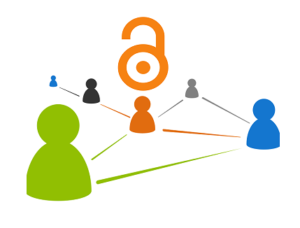Author: Shaharima Parvin, Senior Assistant Librarian, East West University, Dhaka, Bangladesh
Library and information science (LIS) professionals have been incorporating emerging technologies in service innovation and sustainability. Many legacy sectors, including libraries, have been transforming their services and resources through the digital revolution, to fulfill patron’s expectations.
Involvement in the Open Access (OA) movement by Library and Information Science (LIS) professionals in Bangladesh:
Libraries have always been about providing access to scholarly information. LIS professionals in Bangladesh have traditionally been the guardians of books, records, and databases. Things have changed in the libraries of Bangladesh due to the Open Access (OA) movement. OA is essential for scholarly communication in the twenty-first century as this movement ensures equal access to scholarly publications by the research community. Since the Budapest Open Access Initiative was signed in 2002, the availability of OA resources has been rising. Governmental agencies, universities, research institutions, and other stakeholders have introduced or expanded initiatives to make OA content available and accessible. The OA movement has resulted in massive changes for libraries and prompted new ways of thinking. Many librarians’ responsibilities have expanded well beyond their initial job descriptions, particularly due to the OA movement.
The government of Bangladesh has a vision to build “Digital Bangladesh” to democratize information dissemination to foster participatory citizenship. Through the Right to Information (RTI) Act of 2009, the Government of Bangladesh has supported OA initiatives. Digital Library (DL) and Institutional Repository (IR) initiatives are supported by LIS professionals in Bangladesh. Since 2005, research and university libraries in Bangladesh have been using DSpace and Greenstone Digital Library open source software for building DL and IR.
Access to electronic resources by the academic community in Bangladesh has been limited mostly due to awareness and the huge cost associated with accessing such resources. This scenario has improved with the formation of Bangladesh INASP-PERI consortium by Bangladesh Academy of Sciences (BAS) in 2007. It offers a huge number of e-resources for its member libraries with affordable subscription rates. In 2019, Bangladesh INASP-PERii Consortium (BIPC) transformed and was renamed The Library Consortium of Bangladesh (LiCoB). In 2012, UGC Digital Library (UDL) by the University Grants Commission (UGC) of Bangladesh. The main aim of these consortia is to subscribe to electronic resources for the member institutions at lower rates of subscription. In 2007, Bangladesh Journals Online (BanglaJOL) was established by INASP (International Network for Advancing Science and Policy) in order to “provide access to Bangladesh published research, and increase worldwide knowledge of indigenous scholarship”.
Necessity for Scholarly Communication Librarians (SCL) in Bangladesh:
As the function of libraries changes in this OA movement, so does the job of librarians. Libraries’ collective action has become equally vital. Some libraries and professional groups in Bangladesh have a keen interest in developing new skills of upcoming generations to meet the needs of the OA movement and scholarly communication. According to the Association of College & Research Libraries (ACRL) scholarly communication is “the system through which research and other scholarly writings are created, evaluated for quality, disseminated to the scholarly community, and preserved for future use. The system includes both formal means of communication, such as publication in peer-reviewed journals, and informal channels, such as electronic listservs.” Academic and research libraries have potential roles in implementing and sustaining scholarly communication systems. University libraries in Bangladesh always take actions to ensure communities provide equal access to education opportunities and are committed to constant improvement of their services.
 Image credit: Shaharima Parvin via Flickr
Image credit: Shaharima Parvin via Flickr
The concept and need for a scholarly communication librarian are ideas not commonly held in Bangladesh. Basically, library heads and/or the person who is managing the electronic resources, and/or the person who is managing the DL or IR of a library are providing related services already. These include answering queries related to scholarly publishing technologies and platforms, copyright issues, assisting with the evaluation of scholarly contents and so on. But, there are potential additional areas to prioritize for university libraries. New areas include including making policy for scholarly communication models, planning, implementing and assessing scholarly communication related initiatives, open access publishing, publishing software knowledge, programming languages, research data lifecycle models, open licensing, creative commons licenses, collaboration with stakeholders to build events, advocacy, strategic leadership skills, and other issues as per required.
Working as an electronic resource librarian at a university library in Bangladesh, I have observed that university libraries are emphasizing the importance of service innovation, collection and policy development, building strong relationships between libraries and researchers, the quality of research publications, and skills development of library staff.
The East West University (EWU) library is one of the pioneer libraries of Bangladesh with significant impact in the library profession with innovations and leadership in OA. This library is the pioneer for launching the Department Wise Resource Portal with library personnel assigned as a subject librarian for each department. As with any new service, proper policy formation, legislation, and infrastructure are needed. The EWU library is providing scholarly communication librarians and library administration with relevant training in order to gain necessary competencies for SCL.
The library is following the NASIG Core Competencies for Scholarly Communication Librarians. The categories of the core competencies are personal strengths, institutional repository management, publishing services, copyright services, data management services, assessment, and impact metrics. The library administration identifies online training on the current trends, topics, and issues in scholarly communication and assigns library personnel to attend these events. This is the initial stage of the SC plan for the university community, and I am working closely with the library director for implementing the SC plan in our scholar communities.
There is not a doubt that to foster SCL development, we need to be creative and take risks in exploring new ideas and implementing these ideas among scholarly communities. Additionally, collaboration and cooperation with pertinent stakeholders are essential for the improvement and sustainability of the scholarly communication landscape.
Shaharima Parvin
Senior Assistant Librarian
East West University, Dhaka, Bangladesh.
Email: [email protected]
Website http://lib.ewubd.edu